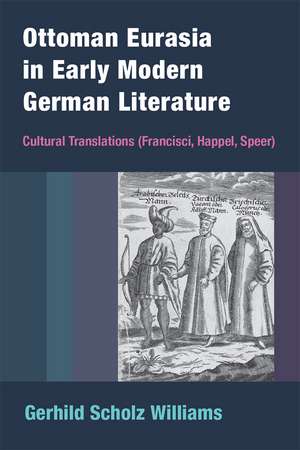Ottoman Eurasia in Early Modern German Literature: Cultural Translations (Francisci, Happel, Speer)
Autor Gerhild Scholz Williamsen Limba Engleză Hardback – 20 mai 2021
Ottoman Eurasia in Early Modern German Literature: Cultural Translations (Francisci, Happel, Speer) explores the variety of cultural and commercial conversations between Europe and Ottoman Eurasia as they negotiated their competing economic and hegemonic interests. Brought about by travel, trade, diplomacy, and wars, these conversations were, by definition, “cross-cultural” and diverse. They eroded the antagonism of “us and them,” the notion of the European center and the Ottoman periphery that has historically shaped the view of European-Ottoman interactions.
Preț: 450.20 lei
Preț vechi: 555.80 lei
-19% Nou
Puncte Express: 675
Preț estimativ în valută:
86.16€ • 89.62$ • 71.13£
86.16€ • 89.62$ • 71.13£
Carte indisponibilă temporar
Doresc să fiu notificat când acest titlu va fi disponibil:
Se trimite...
Preluare comenzi: 021 569.72.76
Specificații
ISBN-13: 9780472132416
ISBN-10: 0472132415
Pagini: 246
Ilustrații: 11 illustrations
Dimensiuni: 152 x 229 x 20 mm
Greutate: 0.48 kg
Editura: UNIVERSITY OF MICHIGAN PRESS
Colecția University of Michigan Press
ISBN-10: 0472132415
Pagini: 246
Ilustrații: 11 illustrations
Dimensiuni: 152 x 229 x 20 mm
Greutate: 0.48 kg
Editura: UNIVERSITY OF MICHIGAN PRESS
Colecția University of Michigan Press
Notă biografică
Gerhild Scholz Williams is Barbara Thomas and David M. Thomas Professor in the Humanities, Vice Provost, Associate Vice Chancellor at Washington University in St. Louis. She is a Sixteenth Century Society & Conference Medalist.
Recenzii
"Ottoman Eurasia in Early Modern German Literature. Cultural Translations (Francisci, Happel, Speer) is a compelling read that would make an excellent addition to any reading list for advanced undergraduate or postgraduate students eager to broaden their understanding of early modern cross-cultural relations."
—Journal of Early Modern History
—Journal of Early Modern History
". . . the close reading of ample textual evidence presented here compellingly documents a qualitative shift toward a more differentiated and benevolent representation of turks and of the Ottoman empire in Germany."
—The German Quarterly
—The German Quarterly
Descriere
Europe and the Ottoman Empire through three 17th-century writers
